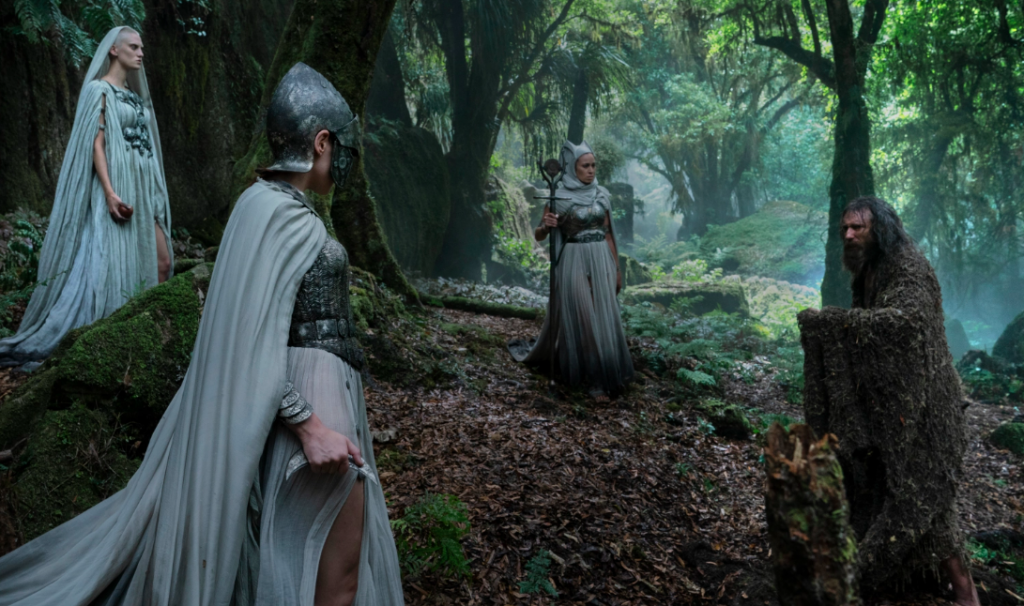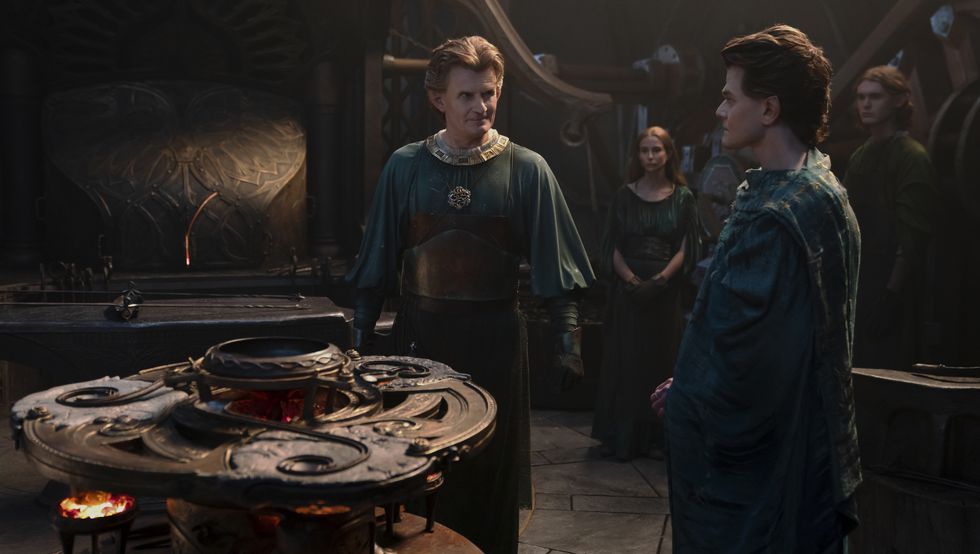Warning: Minor Spoilers Ahead!
Finally, the first season of The Rings of Power is over. “Alloyed” brings us many (expected) answers, but it mainly reveals the biggest structural issues of the show so far. Though at times entertaining, each episode has been wholly uneven, both in terms of plot and pacing. Some events unfold much too quickly, while others are stretched like butter scraped over too much bread. After eight dreadfully messy episodes, it is safe to say that the show not only lacks the fundamental elements of a good story, but it absolutely fails to live up to its name.
The episode opens with The Stranger wandering through the woods before he is discovered by the three Mystics, who reveal to him that he is Sauron. Did this really fool anyone? I highly doubt it. This scene is not only pointless, but it makes no sense because it is never explained why the Mystics believe The Stranger is Sauron; they simply assume he is, which is as frustrating as it is boring. I thought this was a staggeringly weak introduction to the episode, but looking back, it was only paving the way for the nonsense to come.

Galadriel and Halbrand travel across Middle-earth at the speed of light, despite Halbrand’s injuries that seemed so serious he needed “Elvish medicine”—because why else would he go to Eregion? Even more convenient is the fact that the pair arrives at the Elven city at the same time as Elrond. But this is not even the most frustrating part of this scene. Just before Galadriel and Halbrand arrive, Elrond turns to Celebrimbor and reiterates their problem—how will they save the Elven race?—even though both of these characters and the audience have been explained this several times already (and it is repeated many more times in the episode). It’s clear that the writers do not trust their audience. They do not trust us to remember what happened in previous episodes, just as they do not trust us to catch any subtleties or symbolism. Everything must always be spelled out—preferably at least twice— and it is infuriating.
One of the most annoying aspects of Rings of Power is that it wastes an insane amount of time trying to mislead us, only to prematurely hand us the answers. I am not mad that Halbrand is Sauron and The Stranger is Gandalf, on the contrary. These reveals were predictable, but at least for once, Rings of Power seems to have prioritized believable and consistent characterization over shock value, for which I am grateful. However, why did they waste so much time trying to confuse us or repeating the same conflicts (is The Stranger good or bad? Every scene with him asks this question) when they should have elaborated on other overlooked plot elements instead? There are too many to name, but a good example of this is Galadriel’s sudden distrust of Halbrand in this episode. For the entire season, she was convinced that Halbrand was the King of the Southlands, despite all evidence to the contrary, and only now, when it serves the plot, does she start to doubt him. She then asks an Elven clerk to dig through their records of the lineage of the kings of the Southlands … couldn’t she have done a bit more research in Númenor and spared us half of this nonsense show? And Galadriel’s shock and distress upon discovering that Halbrand is Sauron is completely undermined by the fact that she was the one who pushed that title onto him. It would have been much more believable if Galadriel had started to doubt Halbrand sooner or if the show had not rushed the revelation of his true identity—and the entire ending of this episode.

Because, really, I truly cannot believe the forging of the Elven rings happened so soon and so quickly. In the books, it takes Celebrimbor 90 years to forge the rings. In Rings of Power, it takes him 15 minutes. And how convenient that the forging of the rings of power and the creation of Mordor happened a few days apart! Condensing thousands of years into a fortnight, how epic is that? I accept the fact that it would be impossible to tell the story of the Second Age without making changes to the lore, but this episode really proves how much of a mistake it is to condense the timeline. It lowers the stakes and turns everything into a cheap parody of Tolkien. In truth, however, even with its weird timeline, Rings of Power still could have spent a bit more time on the forging of the rings and Annatar’s—I mean Halbrand’s—deception. Because, really, that was incredibly disappointing.
More than that, however, it directly contradicts Tolkien’s lore in fundamental ways and simplifies it into a shallow and generic story that does not deserve to bear Tolkien’s name. In the show, only the three Elven rings are forged, and Galadriel says these should be for the Elves only. Where are the other rings? In the books, Sauron’s plan is to get the Elves to forge the rings of Dwarves and Men so he could forge the One Ring in secret and rule them all, and it is only then that the Elves discover that they have been deceived and decide to forge the Elven rings in secret. None of this occurs in Rings of Power, and to what end? If the writers felt such a strong urge to rewrite Tolkien’s history, why did they not just invent their own?

I will say this one more time. Amazon desperately needed to take its time. An entire season could have been devoted to Halbrand’s deception and the forging of the rings of power. The Númenor and Southlands storylines could have been kept for later and been properly fleshed out. But it seems Amazon was a bit too ambitious and was so impatient to get to the “good stuff” that they forgot the importance of exposition. As a result, everything—even major, critical plot points—turns out to be underwhelming and even comical.
This last episode did a decent job of setting up the next season; Nori has left the Harfoots and is setting off with The Stranger (which I am surprisingly looking forward to seeing); in Númenor, more tensions are set to arise now that the king is dead and that Miriel returns handicapped and defeated over the loss of the Southlands; the Elven rings have been forged, and Halbrand … simply walks into Mordor. Unfortunately, this was a most unsatisfying conclusion because it does not feel earned. Despite all my reservations about the show, I was looking forward to returning home to Middle-earth after all this time, but whatever The Rings of Power is, it is not Tolkien.
